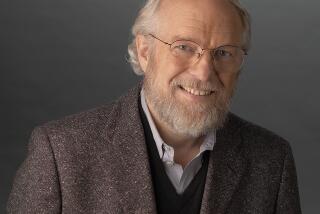Jobs Takes NeXT High-Tech Road to Higher Education in Coronado
- Share via
NeXT Inc. Chairman Steven P. Jobs brought his one-man road show to Coronado Monday to display his new personal computer to a group of college administrators, the type of folks who may ultimately decide his company’s fate.
And while the merits of the NeXT computer relative to its competition are debatable and its chances of success in the marketplace still unfathomable, Jobs’ showmanship talents are unquestionable. His hour and a half presentation before a jam-packed crowd of 250 at the Hotel del Coronado was a crowd pleaser.
Jobs gave his views of how personal computers will evolve over the next 10 to 15 years at a seminar entitled “The 21st Century University.” He asserted that NeXT will become the “fourth wave” PC by the early 1990s, taking its place in a succession of dominant personal computers including the Apple II, IBM PC and the Apple Macintosh.
Unveiled to Eager Audience
Last month, Jobs unveiled the NeXT computer before a crowd of 3,000 in San Francisco, an event that garnered reams of media attention, even though volume shipments of the machine are not scheduled to begin until next spring. That the computer was a year late in being introduced only heightened industry anticipation.
Costing about $6,500, the NeXT computer at first will be marketed strictly to the “higher education market,” meaning mainly universities, Jobs said. Sales to businesses and individuals will come later.
“There are 3,000 universities, 45,000 (academic) departments and 600,000 faculty members” in the United States, said Jobs in an effort to persuade a questioner that the academic market was adequate.
Emerging from the three years of secrecy that surrounded NeXT’s product development, Jobs now makes regular promotional presentations before educators such as those in attendance Monday. After his talk, Jobs went directly to California State University at Dominguez Hills, where he addressed a group of 400 academicians in the afternoon.
After founding NeXT in 1985, Jobs, 33, promised to develop a personal computer that would revolutionize PCs. Jobs had pulled it off before: He co-founded Apple Computer in 1976, guided the development of the Apple II and Macintosh, and led the company to $2 billion in sales. He resigned as chairman in 1985 after losing a power struggle to president John Sculley.
In general terms, educators who witnessed the Monday demonstration seemed enthusiastic about NeXT’s computer.
“I found it utterly impressive. (Jobs’) comprehension of technology, of what actually goes on in a university and how he has matched it up with the way the computer would be used, is the most striking part of it,” said Michael Mullen, associate director of the Council of Higher Education of Virginia.
As demonstrated on Monday, the NeXT computer is loaded with features including digital sound, voice mail, a high-resolution, 17-inch monitor, a “user-friendly” Unix-based operating system, a “mainframe on two chips” processor and an “eraseable” or re-recordable optical disk drive that stores 10 times the information of comparable magnetic disks.
Incredible Capacity
The optical drive, which is made by Canon of Japan, gives NeXT immense data storage capacity, enabling it to file texts such as the complete works of Shakespeare and the Merriam-Webster Collegiate dictionary. The NeXT system will also include a laser printer priced at a relatively low $2,000.
Much of Jobs’ presentation dwelt on his futuristic concept of the “digital library,” the storage of knowledge in computer data banks instead of in books and libraries. The digital library would be accessed by students on NeXT personal computers via coaxial cable.
One of the many extravagant claims made by Jobs on Monday was that the digital library as envisioned by NeXT would “change the way students and researchers use educational material.”
The library-of-the-future concept struck a responsive chord among many of the 250 educators present, several of whom were university presidents.
“It was mind-expanding and mind-boggling,” said Stephen Nadauld, president of Weber State University in Ogden, Utah. “We’re conducting a statewide study looking at spending $76 million for a library system expansion. Maybe we should think about spending that $76 million in ways other than brick and mortar. Maybe we should put it in electronics.”
‘Aggressively Accurate’
David Roselle, president of University of Kentucky, said Jobs’ presentation was “excellent. (Jobs’) view of the future of computing is accurate--aggressively accurate, but accurate,” Roselle said.
Jobs told a questioner after his talk that NeXT had approached the Library of Congress about starting a digital library but that the library “just didn’t get it. We might do it ourselves.”
Jobs showed a film of NeXT’s automated plant in Fremont where it manufactures its circuit boards with robots in 20 minutes.
Asked to comment on the “computer virus,” Jobs said of author Robert Morris: “I would like to shake his hand.” In designing the virus, Morris displayed “proclivities” similar to those of Jobs and his Apple co-founder Steven Wozniak. Jobs explained that before the pair founded Apple they invented a “blue box,” an device that enabled users to make long distance telephone calls for free.






